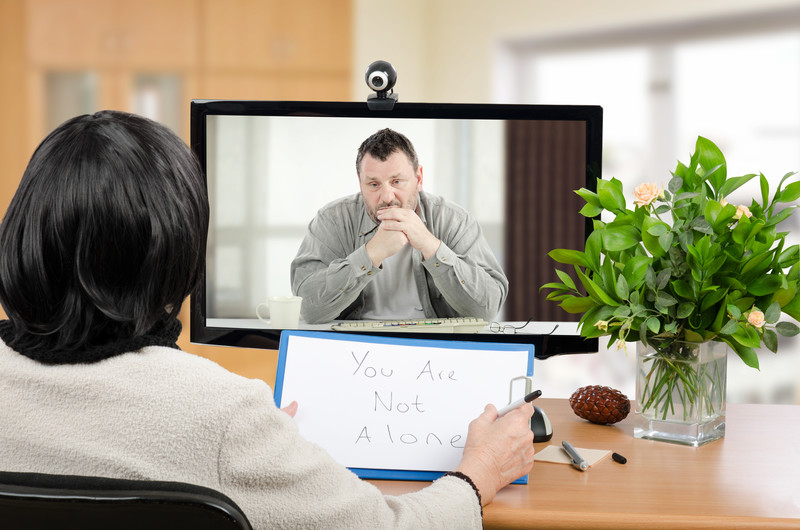Teletherapy, Is It Right For Me?
Since the outbreak of COVID19, many healthcare professionals have switched to telehealth platforms, including counselors and therapists! Called Telemental health or teletherapy, it is the use of telemedicine to provide mental health assessment and treatment from a distance, such as online or through the phone. For those of us more accustomed to traditional face-to-face therapy sessions, it is normal to feel hesitant, uncomfortable, or even skeptical. However, teletherapy does have its benefits and can be very effective.
Here Are Six Things to Know:
- Your Confidentiality is a Priority
Confidentiality is the foundation therapy builds upon and is crucial to a trustworthy relationship between therapist and client. For this reason, counselors take extra precaution to protect you when offering services through the phone or online. Information transmitted online offers more opportunities for privacy leaks and hacks. Counselors are required to use HIPAA approved online platforms that protect your personal information each step of the way. These platforms reduce the risks of breaches occurring over the internet and your private information being compromised.
- Teletherapy Increases Access to Treatment
Physically traveling to and from a therapy office can be cumbersome or even impossible for some, especially for those who are sick or disabled. Telemental health extends care to those physically unable to come in for treatment. It also allows you and your therapist to continue care if either is ill but well enough to engage in the session. Telemental health also provides a safe alternative when severe weather prevents travel or during times of social distancing, as we are experiencing now with COVID-19.
- TeleMental Health Increases Options in Type of Treatment and Therapist
Finding therapists with specific areas of expertise such as trauma, marriage, grief, or a certain mental health disorder may otherwise be limited by physical traveling distance; but, telemental health extends access to therapists across your state. Teletherapy also makes it easier to find a therapist who speaks the same language or is more experienced working with a specific cultural group.
- The Quality of In-Person Therapy is Not Lost
The rapport between you and your counselor is important. Many are concerned that the screen or phone will create a barrier that makes the therapeutic process too impersonal. However, compared to face-to-face therapy, there is no significant difference between the perception of the working relationship between the client and the teletherapist. There was also no significant difference in overall satisfaction with services. When one study controlled for technological difficulty, the study indicated that session smoothness and depth were not significantly different from in-person treatment either.
- Your Safety is Important
Since teletherapists are physically distant from you, responding to a crisis is more tricky than being in the room with you. However, your teletherapist will create a safety plan with you before the first session begins just in case! This helps to ensure safety in the event of an emergency.
- Teletherapy is Effective for Kids, too!
One qualitative study showed that kids and teens tend to feel more comfortable with technology than adults when in therapy remotely. Children also felt they had more choice in the process of therapy. In some cases, telemental health has been shown and hypothesized to be better for some kids than in-person care, like those with some autism spectrum disorders. Some children with ADHD had a higher satisfaction rate when using teletherapy as opposed to traditional therapy.
Telemental health can be a new and exciting way to experience therapy during this time. At the same time, teletherapy is not for everyone and it is important to share any concerns with your therapist who has expertise in navigating telehealth benefits and challenges. We work with you to help you choose the best course of treatment for you! For more tips on creating a confidential space for teletherapy, frequently asked questions about telehealth, or information on getting started with teletherapy at Fuller Life, you can read more here or to ask a question feel free to email us at info@fullerlifefamilytherapy.org.
Read more on Teletherapy:
What to know about Teletherapy by Elisa Squier
References
- Cherry, K. (2020, May 11). The Pros and Cons of Online Therapy. Retrieved August 03, 2020, from https://www.verywellmind.com/advantages-and-disadvantages-of-online-therapy-2795225
- Hilty, D., Ferrer, D., Parish, M., Johnston, B., Callahan, E., & Yellowlees, P. (2013, June). The effectiveness of telemental health: A 2013 review. Retrieved August 03, 2020, from https://www.ncbi.nlm.nih.gov/pmc/articles/PMC3662387/?fbclid=IwAR3xtzZHjb9PcMMo47PNehxsQMcb_CvEWAw2-e_5l9EOAjUOOCQxK6cfHJo










